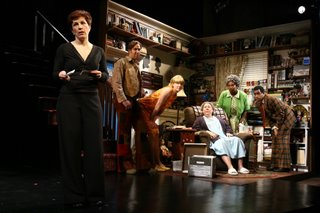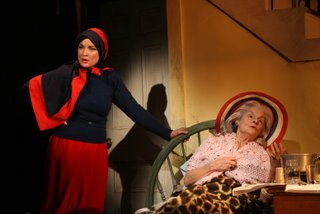
Well (at the Longacre)
Well has a deceptively simple design to match a deceptively complicated subject. At first glance, the estimable Tony Walton seems to have fallen down on the job, as only stage left has any significant set element. Stage right, which is pretty much barren, acts as a kind of soapbox, for performance artist Lisa Kron to begin her "solo show with other people," a "theatrical exploration" of issues of health and wellness that, she stresses, is not autobiographical. That said, her material draws from own college-age recovery from debilitating allergies--a recovery in stark contrast to her mother, Ann, a one-time community activist who has spent years confined largely to her La-Z-Boy recliner, due to her own mysterious, chronic fatigue-like illness. Ann (played by actress Jayne Houdyshell), her La-Z-Boy, and her sitting room are all recreated on the side of the Longacre stage, as Lisa tries to tell her story--but the polite, yet flinty, Ann, keeps interrupting with her own conflicting accounts. This throws Lisa’s abstract theorizing into hopeless chaos, and complicates the motivation and blocking of the four supporting players, who, cast as doctors, nurses, and childhood playmates, fall into a muddle.
Confused? Rest assured that WELL, a hit at the Public two years ago, sorts itself out to become a genuinely moving story. Lisa's side of the stage, where she natters on pretentiously (and, strenuously, works the backdrops and the furniture that rolls on and off, trying to maintain order), is in time reduced to rubble, exposing the theater's back wall, by all the comical hijacking. This breakdown of the invisible wall that exists between mother and daughter sets the stage for Ann to express her long pent-up feelings about her condition, in a quietly shattering monologue, brilliantly acted by Houdyshell, that clears the air between the two women. The universal themes of the piece are intact, but the artifice that interferes with the specific situation that the play grows from--Ann at one point demands that the spotlight that Lisa inhabits be turned off--is gone. Critics who have complained that the show's "un-Broadway" design is too small have missed the point. Its divide contains universes.
If I were director Leigh Silverman, I might have gone a little farther with the games-playing from which the show takes off and replaced Kron with a genuine actress--severely dressed in basic performance artist black she's a little too arch for the concept, and I found her lacking in empathy. But it is her concept, and she has done exceptionally well by her mother. Walton's living space, which Ann has subdivided for her little collections (like stamps, sorted by denomination, and mementos of her daughter’s previous shows), is neat but somewhat distressed, like Ann herself, who can barely climb the adjoining stairs and pretty much lives in her bedclothes and housedress. The show is having a hard time finding an audience, but, to coin a phrase, a visit is "well" worth it.

GREY GARDENS (off Broadway at Playwrights Horizons; closes April 30)
Mothers-and-daughters week continues with GREY GARDENS, but even if it were still running next month it would not be a suitable choice for Mother's Day entertainment unless your mother has a very, very warped worldview. A reality program long before the cavalcade of losers and hangers-on started on TV, the riveting 1975 documentary on which this new musical is based pulled back the curtain on a forgotten wing of the Kennedy family, mother Edith and daughter Edie Bouvier, who lived eccentric, hand-to-mouth, mad-hatter lives in the dilapidated Hamptons mansion of the title. The promotional materials for the show make extravagant claims for the individuality and influence of the Bouviers--I dare anyone to actually wear the dresses "inspired" by Edie Bouvier’s bizarre thrown-together outfits. The appeal of the movie, which fascinated me when I first saw it a decade ago, is watching these two borderline-insane ladies going about their business as cheerfully as possible, trying as best they can to block out the private hell they live in day to day.
Documentary isn't drama, so the musical, which begins with a 1973 prologue, opens up into Grey Gardens' gilded past in the 1940s, when Edie, trying to live down what was in those days a free-living lifestyle, was expecting a proposal from Joseph Kennedy, Jr., and Edith was trying to keep her passive-aggressive tendency to meddle in check for the engagement to happen. The show is cleverly cast, with many of the actors playing dual roles: Christine Ebersole, terrific as Edith in Act I, is positively astonishing as Edie in Act II, when the delightful Mary Louise Wilson assumes the part of Edith. [And here you were still trying to sort out Lisa and Ann Kron from the previous entry.] Act I is like a cracked version of HIGH SOCIETY, with a little SOUVENIR thrown in regarding the warm, wise-cracking relationship between Edith, who gives wretched recitals at inopportune moments, and her gay accompanies. The design team is on their best behavior--Allen Moyer's set is sumptuous, William Ivey Long's costume design and Paul Huntley's wig and hair design, divine. The direction, by Michael Greif, is assured, the book (from I AM MY OWN WIFE author Doug Wright) acceptable in trying to suss out some rationale for the subsequent storyline, and the music, by Scott Frankel and Michael Korie, fine. But what everyone has come to see (or, rather, to gawk at) is in Act II, where the show really delivers--though anyone who hasn't seen the film is bound to be mystified, and maybe feel a little short-changed, as the Bouviers descend into their absurdism.
After a long intermission to demolish the set, the second act begins with Edie, in song, modeling her "Revolutionary Costume for Today," a drop-dead hilarious number, then moves on to other highlights, notably "Jerry Likes My Corn," where the two fall out over the mansion’s monosyllabic handyman, played by Matt Cavenaugh, the dapper Kennedy in Act I. Edie pulls herself together long enough to deliver the show’s most wrenching song, "Another Winter in a Summer Town," a sure standard--and good enough to make you forget the uninspired, FOLLIES-like staging of much of the act, given over to ghostly visitations from the past. Still, qualms aside, if there really had to be a GREY GARDENS musical, I'm not unhappy that this is it, and any opportunity to see Ebersole and Wilson is action is to be savored. So, too, the designers, who relish the chance to undo everything in Act I--I hadn't mentioned how Peter Kaczorowski's handsome lighting plummets into the near-permanent twilight caused by infrequent payment of the electric bills, or the creepy, Bernard Herrmann-esque underscore provided by sound designer Brian Ronan. A word, too, about Wendall K. Harrington's funny-ghastly projections, of the cats and raccoons who prowl what's left of Grey Gardens. It's haunted-house chic to accompany the forlorn fantasists lurking within its doors.
[Photos courtesy Joan Marcus]


No comments:
Post a Comment